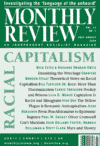Volume 72, Issue 03 (July-August 2020)

The entire United States has been upended by weeks of protests, extending to over 150 cities, sparked by the racist police murder of George Floyd. The present special issue of Monthly Review is devoted to exploring the complex interweaving of the classical Marxian critique with the rapidly developing critique of racial capitalism. | more…

Indigenous and African resistance and intellectual traditions provide key insights to the very nature of capitalism and how it has unfolded throughout space and time, its tentacles emanating from Europe and stretching across the globe in the forms of imperialism and colonialism. | more…

Some Theoretical Insights
In recent years, “racial capitalism” has ascended across the humanities and social sciences. It has arisen as a conceptual framework to understand the mutually constitutive nature of racialization and capitalist exploitation, inter alia, on a global scale, in specific localities, in discrete historical moments, in the entrenchment of the carceral state, and in the era of neoliberalization and permanent war. | more…

Racial Capitalism, the Settler State, and the Challenges Facing Organized Labor in the United States
Organized labor—based on white-exclusive and later white-dominated, though not necessarily exclusive, trade unions—formed itself as part of the settler state, not in the sense of being an apparatus of the state, but in the sense of accepting certain important precepts. The unions took for granted the nature of the settler state and, as such, conceived that the unions were to exist to serve the “legitimate” population, or at least the working class of the legitimate population. | more…

Toward a General Strike for Abolition
Poultry-processing work lies within a larger web of carceral geographies that extend beyond the prison walls into factory floors, neighborhoods, and schools. These geographies depend on and are produced through racism, as the production of unequal vulnerability to premature death. Racial capitalism connects the poultry plant to the prison alongside the movement for abolition beyond the prison. | more…

The Immutable Evidence that Capitalism Is Racist and Misogynist
Capitalism is a global racialized structure. Although many of the exploited working class are white peoples, people of color, especially women of color, have generally borne the brunt of the human suffering inflicted by capitalism. There is no doubt that colonialism and U.S. slavery were economic systems, but they were also brutal attacks on non-Western peoples. | more…

COVID-19 is a great revealer, laying bare the structures of racial disposability that have sacrificed people, from migrant detainees to meat packers. We are also witness to the rise of anti-Asian violence. Brutal attacks against Asian Americans have exposed the fraudulence of the model minority myth and the assimilationist paradigm that legitimizes state violence against Black and Brown bodies. | more…

New Directions in a Life with Marxism
The history and nature of racial capitalism remain primary questions of our times. Its true significance and gravity threaten to reveal everything about our contemporary world, from our immediate social arrangements to the global system. Within this, corporate power and the hegemonic culture shape the world at the limits of our perceptions. We must simultaneously engage the contemporary politics of knowledge production around these issues, both within the academy and in popular culture. | more…

Oliver Cromwell Cox insisted on dealing with the crucial issues of his time and on telling the truth as he saw it, regardless of whose toes may have been stepped on or whose sensibilities may have been injured. He has aided in preventing the complete stultification of academic social science and in the long run exercised an immense influence on American life. | more…

The rise to prominence of analyses of racial capitalism represents a breakthrough in Marxian theory. This has necessarily been accompanied by a critique of previous Marxian analyses, which all too often ignored or minimized the relation of slavery to capitalism. In recent years, however, these criticisms of orthodox Marxist treatments of slavery have been extended, much more problematically, to the work of Karl Marx himself. Although Marx never wrote a treatise on slavery, the issue of slave labor was woven into his analysis of social formations, both ancient and modern, and was inextricably intertwined with his treatment of wage labor. | more…








